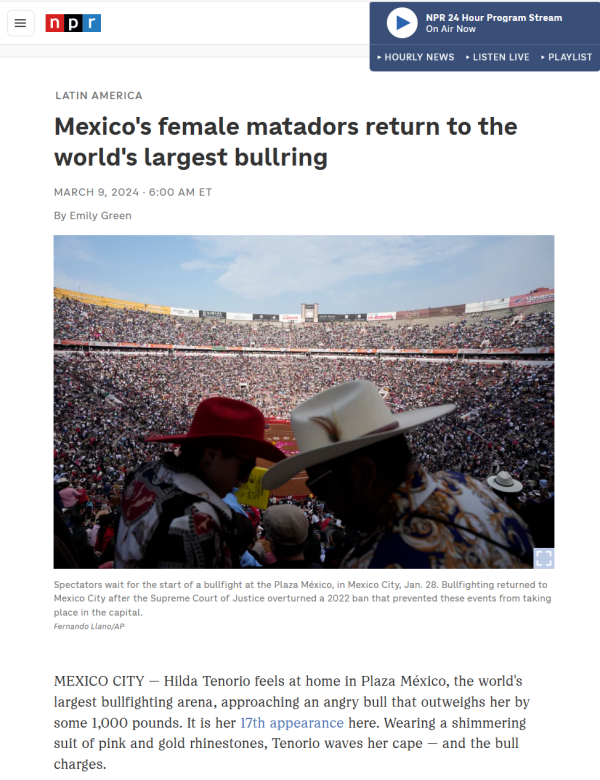

You can read the full interview for free online here.
I was contacted by the National Public Radio Service of the United States originally to give some comments on the reopening of the largest plaza de toros, ‘bull-ring’, in the world, in Mexico City after it was sumararily closed by a judge on what appears to have been a whim. The legal argument proffered, that the citizens of the city had a right to live in an environment free from violence was entirely without merit as it hard to see how boxing tournaments and martial arts contests would surely be banned under those auspices, unless it is the killing of the animal which is the crux, in which case farewell to slaughterhouses.
In the end, I was actually asked to talk about women in bullfighting, which I have always found a fascinating subject. I actually began the post-script of my book, Into The Arena, by saying:
The book is dominated by men. This is because it is representative, but there are women in the world of the bullfight. Like the Venezuelan torera Conchita Cintrón, ‘The Golden Goddess’, who died aged eighty-six in February 2009, warranting obituaries in every major British newspaper as one of the greats of the bullfighting world, although in the write-ups her abilities were overshadowed by her sex. Antonio Ordóñez and Luis Miguel Dominguín were not so well covered in death. Or Cristina Sánchez, who was by all accounts a great matadora (not just a torera, as, by the time of her ‘moment in the sun’, a woman could officially take that title) but whose career stalled because the great men of the day would not fight by her side. Or the novillera Conchi Ríos, whom I saw turn the men’s sniggers into olés in Casa Matías as we watched her on the television while she fought around the corner in the Maestranza in May 2010. Or another trainee, who partnered me in training … to whom I explained that the bullfighter could be Lady Macbeth too, although what she did with that advice I’ll never know.
I had not revisited those words since I wrote them almost fifteen years ago, but apparently Shakespeare is still foremost in them, as the article version of the interview NPR published – and over 250 other stations republished from Alabama to Wyoming –
Alexander Fiske-Harrison, author of Into The Arena: The World Of The Spanish Bullfight, likened female bullfighters to women playing Shakespeare’s Hamlet or Macbeth. “If the setup is such that it is defined by masculinity, you are subverting expectations,” he says.
Necessarily, such interviews always cut out the complexity and nuance of a real viewpoint on such matters: at the time the context I was discussing was how all art is an act of subversion as creativity requires innovation rather than meeting expectation through repetition, but there is always a line about how far one can go before one has departed from the chosen artform all together. I referenced successful examples like Matthew Bourne’s famous all male Swan Lake and my personal favourite, Denzel Washington’s extraordinary performance as a black Macbeth in Joel Cohen’s film of that name.)
I went on to make a more important practical points about the problems of a spectacle where the audience is 2:1 ratio men to women (and most of those women attending with a man), followed by what I have always thought was the greatest difficulty in a career where advancement comes from appearing alongside superior exponents.
Fiske-Harrison says male bullfighters have historically not wanted to mix with women.
To read on, click here.
